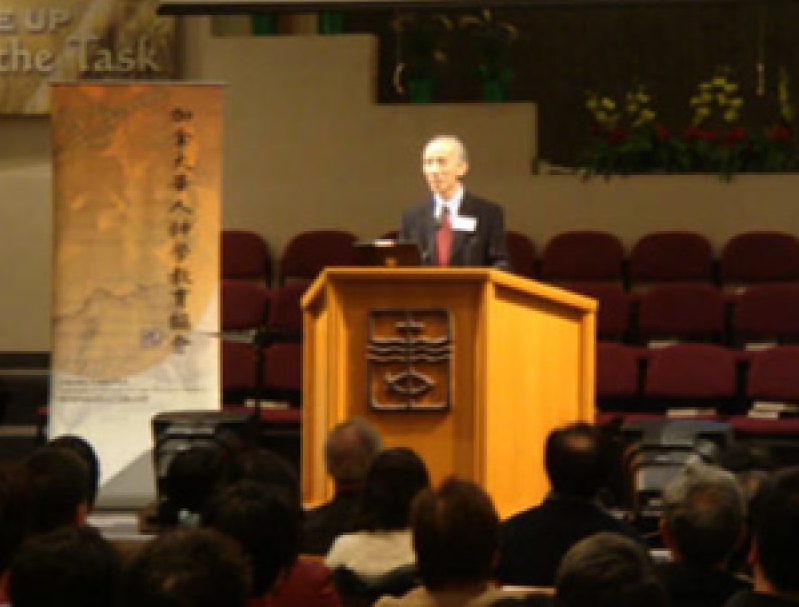
Toronto, Canada - “God towards China”, a cultural seminar hosted by Association of Canadian Chinese Theological Education and co-hosted by Grace to Chinese International kicked off from the east coast of Canada on Apr. 12th.
The organizer has invited two professors of religious studies from universities in China - He Guang Hu and Gao Shi - to speak at the cities of Toronto, Kingston, Ottawa, and Montreal.
On Apr. 13th, the gathering began with the crowd singing “Mission China” and showing film clips of testimonies from pastors and various brother sand sisters.
That day, He Guang Hu, professor of Remin University of China School of Philosophy in Religious Studies, spoke as the main-speaker about “Christianity and Spirit of Morality of China Today.” He spoke on three aspects: “The morality of China today”, “morality and social institutions” and “Christianity and China’s Spirit of Morality.”
In the beginning, Professor He spoke from the perspectives of Sociology, Economics and History to illustrate the situation of the distortion of morality today. Speaking about filial piety, according to a 2006 report conducted by Supreme People's Procuratorate, approximately 80% of the seniors in China are forced to live alone, and 86% of them got sick heavily but could not afford to visit hospital. Their sons and daughters enjoyed a high standard of living, but very few of them abides by a very important Chinese culture, which is “filial piety comes before hundreds good works.”
China today is facing a major problem in the upholding of integrity. In 2002, numerous reports of theft, counterfeits, and falsification of financial reports and numbers in transactions, occurred, and the frequency of them seriously lower the level of trust within the market and in business deals.
When addressing the abidance of the rules and regulations, the professor expressed that by the road in China today, you can see signs that say “Let’s Clean this World”, but so many people still just toss their trash on the floor while standing beside the sign. These kinds of behaviors of knowing and saying one thing but doing another occur quite rampantly.
Professor He said, “Social policies influences morality.” These kinds of immoral conducts can be attributed to the flaws, deterioration, and injustice of the social system. He listed several examples of corruptions such as constructions supposedly carried out in the name of maintenance rebuilding, Quotas on Imports, and Land Requisition System.
The social policy of constructions supposedly carried out in the name of maintenance rebuilding allows government officials to use public funds in building magnificent buildings or reception areas, allowing them to develop the bad habit of abusing the funds.
In addition, the law has not sufficiently protected the farmer’s rights of land ownership. Under the Land Requisition System, they are forced to either give up their land to the officials or sell it at the lowest price. These kinds of policies are corrupted and unjust.
Professor He said, “Policy is not justice, but the policy should be lawful and it must reveal justice.” Not all of the social systems are correct. An example is the apartheid system that South Africa implemented formerly, which was neither just nor lawful. In order to setup a just policy, justice must come first, and justice originates from the Holy Spirit – the spirit of holiness.
When speaking of Christianity and China’s spirit of morality, Professor He explained that the misunderstandings that the Chinese have towards Christianity and the misconception that the foreigners have toward China’s atheism. God’s presence in China’s history has its roots and foundations. It wasn’t brought from other countries. The Chinese has always had religion. They believed and worshipped God up until the policy of only the emperor can worship God was put in place, then the color of the ethnic religion slowly began to fade off, leaving behind the morals.
Soon after, morality was philosophized, such as the change of the name to “Heavenly Path”, which brought the distance even further from an average citizen’s area of understanding. Therefore, morality has lost its foundation in the people. Moral viewpoints were flipped upside down and the social system deteriorated very rapidly.
Professor He explained that in ancient times the emperor is consider as God and his speech is the law, and the high officials are the servants. Under this kind of institution, those in government positions were deified, people were categorized into social classes, which left them feeling insecure. In the ancient Confucius sayings “Love, righteousness, manner, wisdom, and trust”, “love” has become very narrow, “righteousness” has become overly secularized, “manner” has become hierarchical, “wisdom” has become too practical, and trust has become too short in time. However, everything is different inside God’s institution of social systems.
The sons and daughters of God are all equal before God. The Holy and philanthropic love of Christ are not just fair, but it also surpasses the system of equality. In the eyes of God, there is no hierarchy, everyone is a sinner, and even those in holding governing authority should not be deified as God. Their authority needs to be restricted.
In conclusion, Professor He said, “The morality of China today needs to be reformed; in order to reform the system, the spirit of justice is required; the spirit of justice is the spirit of holiness, which is the Holy Spirit. Therefore, the morality of China today needs the spirit of Christianity.”
[Editor's note: reporter Sally Peng in Toronto contributed to this article.]







